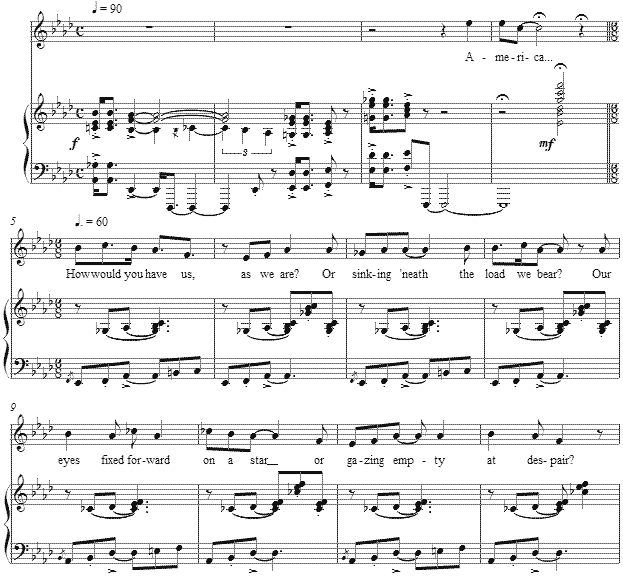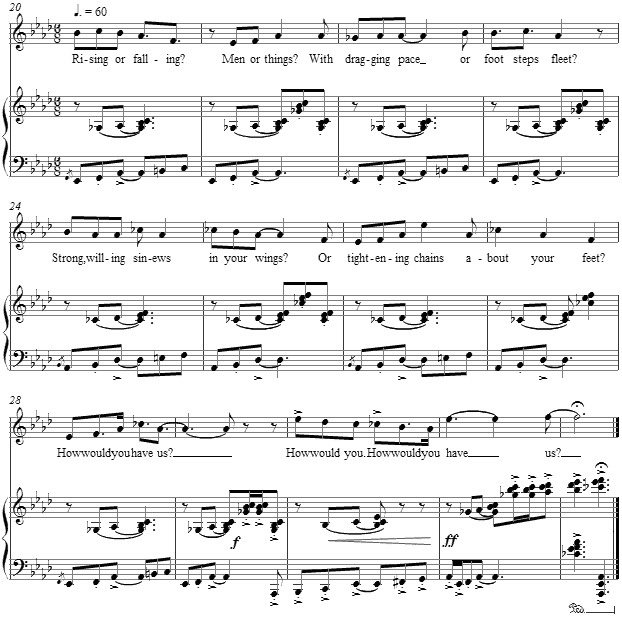Music and Texts of GARY BACHLUND
Vocal Music | Piano | Organ | Chamber Music | Orchestral | Articles and Commentary | Poems and Stories | Miscellany | FAQs
To America - (2009)
James Weldon Johnson
for medium or high voice and piano
How would you have us, as we are?
Or sinking 'neath the load we bear?
Our eyes fixed forward on a star?
Or gazing empty at despair?
Rising or falling? Men or things?
With dragging pace or footsteps fleet?
Strong, willing sinews in your wings?
Or tightening chains about your feet?[ 2 pages, circa 1' 15"]
James Weldon Johnson
The text is drawn from Johnson's Fifty Years & Other Poems, The Cornhill Company, Boston, 1917. While the text was likely intended originally to refer to the black experience in the United States, the sentiment is without argument a universal one, in the same way as the freeing of the slaves from Egypt during the time of Moses was universal to many groups' expressing their urge and need for freedom. Johnson addresses his questions "To America." I do as well, in a time and age in which the sentiment for what is often called the "Nanny state" seems to place municipalities, counties, states and even the nation on a collision course with simple economics. Idealism does not trump the unrestrained laws of the market place, as the legal bankruptcy of a city like Vallejo, California, proves. When the numbers do not add up, all the political sentiment in the world does not remake simple arithmetic.
One notes in recent Congressional discussions about so-called universal healthcare that legal penalties of literally many years in prison for not purchasing health insurance has been suggested by lawmakers. Healthcare or fines and prison? The notion of economic slavery grows now, as nations' public debt grows to mammoth proportions, and the phrase "intergenerational debt" has entered the parlance. What is intergenerational debt if not "tightening chains" in Johnson's fine imagery. What is debt service on so-called public debt if not that which causes man's "dragging pace?" Johnson argues against this, as do I.
The duple meter introduction, serving also as a short bridge between the two verses of the basic song form, leads to a dominant cadence. The 6/8 meter which follows sings out a harmonic blues pattern with blue notes in melody and accompaniment. The first phrase, "America," could begin the melody for the "America, the Beautiful" but does not. Rather it serves to introduce Johnson's several pointed questions which a century later remain sadly unanswered, even assailed in the public forum.
The last lines repeat the question, even as a demand for an answer. "How would you like to have us?" For Johnson, the answer was free -- rising, eyes fixed on a star, strong and with footsteps fleet. This is the charge for freedom, and it is a challenge against that governance which would deprive men, as it always has around the world, of such freedom as many today enjoy.
The score for To America is available as a free PDF download, though any major commercial performance or recording of the work is prohibited without prior arrangement with the composer. Click on the graphic below for this piano-vocal score.


